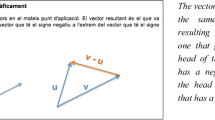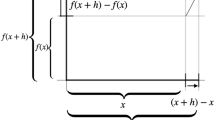Abstract
This is a report on a naturalistic study of the role mathematical paradoxes can play in the preservice education of high school mathematics teachers. The study examined the potential of paradoxes as a vehicle for: (a) sharpening student-teachers' mathematical concepts; (b) raising their pedagogical awareness of the constructive role of fallacious reasoning in the development of mathematical knowledge. Course material development and data collection procedures are described. Results obtained in parts of the study through written responses and class-videotapes are analyzed and discussed. The findings indicate that the model of dealing with paradoxes as applied in this study has relevance to such aspects of mathematics education as cognitive conflicts, motivation, misconceptions and constructive learning.
Similar content being viewed by others
References
BereiterC.: 1985, ‘Toward a solution of the learning paradox’, Review of Educational Research 55(2), 201–226.
BerlyneD. E.: 1960, Conflict, Arousal, and Curiosity, Mc-Graw Hill, New York.
Bunch, B. H.: 1982, Mathematical Fallacies and Paradoxes, Van Nostrand Reinhold Company.
CantorG. N.: 1983, ‘Conflict, learning and Piaget: Comments on Zimmerman and Blom's “Toward an empirical test of the role of cognitive conflict in learning”’, Developmental Review, 3, 39–53.
Dörfler, W., et al.: 1988, ‘Action group 6: Pre-service teacher education’, in Hirst Ann and Key (eds.), Proceedings of the 6th International Congress on Mathematical Education, ICMI Secretariat, Janos Bolyai Mathematical Society, Budapest, pp. 177–190.
Eves, H.: 1983, Great Moments in Mathematics, Dolciani Mathematical Expositions (Vol. 5-before 1650, Vol. 7-after 1650), The Mathematical Association of America.
GardnerM.: 1982, AHA! Gotcha-Paradoxes to Puzzle and Delight, W. H. Freeman and Company, New York.
GardnerM.: 1983, Wheels, Life, And Other Mathematical Amusements, W. H. Freeman and Company, New York.
FlavellJ. H.: 1963, The Developmental Psychology of Jean Piaget, Van Nostrand, Princeton, NJ.
FlavellJ. H.: 1987, ‘Speculations about the nature and development of metacognition’, in WeinertF. E. and KluweR. H. (eds.), Metacognition, Motivation, and Understanding, Lawrence Erlbaum Associates, London, pp. 21–29.
Fujii, T.: 1987, ‘The role of cognitive conflict in understanding mathematics’, in Bergeron et al. (eds.), Proceedings of the 11 th International Conference Psychology of Mathematics Education, Montreal, Vol. III, pp. 141–147.
Huck, S. W. and Sandler, H. M.: 1984, Statistical Illusions, Harper and Row Publishers.
Kleiner, I.: 1988, ‘Thinking the unthinkable: The story of complex number (with a moral)’, Mathematics Teacher October, 583–592.
MiddletonK.: 1986, ‘The role of Russel's paradox in the development of 20th century mathematics’, Pi Mu Epsilon 8(4), 234–241.
MarzanoR. J., BrandtR. S., HughesC. S., JonesB. F., PresseisenB. Z., RankinS. C., and SuhorC.: 1988, Dimensions of Thinking: A Framework for Curriculum and Instruction, Association for Supervision and Curriculum Development, Virginia.
MasonJ., BurtonL., and StaceyK.: 1985, Thinking Mathematically, Addison-Wesley Publishing Comp., U.K.
Movshovitz-Hadar, N.: 1988, ‘Mathematical paradoxes-A vehicle for preparing prospective secondary teachers in mathematics’, in Dossey, J. (ed.), Papers presented at the 6th International Congress on Mathematical Education, Action Group 6, Budapest 1988 (in press).
Movshovitz-HadarN., InbarS., and ZaslavskyO.: 1986, ‘Students' distortions of theorems’, FOCUS—On Learning Problems in Mathematics 8(1), 49–57.
Movshovitz-HadarN., ZaslavskyO., and InbarS.: 1987, ‘An empirical classification model of errors in high school mathematics’, Journal of Research in Mathematics Education 18(1), 3–14.
NickersonR. S., PerkinsD. N., and SmithE. E.: 1985, The Teaching of Thinking, Lawrence Erlbaum Associates, New Jersey.
NorthropEugene P.: 1975, Riddles in Mathematics: A Book of Paradoxes, Robert E. Kreiger Publishing Company, Huntington, New York.
PapertS.: 1980, Mindstorms, Basic Books, New York.
PiagetJ.: 1970, ‘Piaget's theory,’ in MussenP. H. (ed.), Carmichael's Manual of Child Psychology, Vol. 1, 3rd edition, Wiley, New York.
PiagetJ.: 1977, The Development of Thought: Equilibration of Cognitive Structures, Viking Press, New York (from French, 1975).
PimmD.: 1987, Speaking Mathematically—Communication in the Mathematics Classroom, Routledge & Kegan Paul, London.
Polya, G.: 1945, How to Solve It, Princeton University Press.
RombergT. A.: 1988, ‘Can teachers be professionals?’, in GrouwsD. A. and CooneyT. J. (eds.), Perspectives on Research on Effective Mathematics Teaching, Vol. 1, NCTM and Lawrence Erlbaum Assoc., Reston, VA.
SchoenfeldA. H.: 1985, Mathematical Problem Solving Skills, Academic Press, Orlando, FL.
SigelI. E.: 1979, On becoming a thinker: A psycho-educational model’, Educational Psychologist 14, 70–78.
Skemp, R. R.: 1976, ‘Relational understanding and instrumental understanding’, Mathematics Teaching No. 77, 20–26.
Smullyan, R.: 1978, What Is the name of This Book? Penguin Books.
Steiner, H. G.: 1990, forthcoming, ‘The fragility of knowledge in the educational context-the case of mathematics’, Zentralblatt Fuer Didaktik der Mathematik (ZDM) Karlsruhe, F.R.G.
WhiteA.: 1987, Humanistic Mathematics Network, Newsletter No. 1 (August 87), Harvey Mudd College, Claremont, CA.
WoodsP.: 1985, ‘Sociology, ethnography and teacher practice’, Teaching and Teacher Education 1(1), 51–62.
ZimmermanB. and BlomD.: 1983, ‘Toward an empirical test of the role of cognitive conflict in learning’, Developmental Review 3, 18–38.
Author information
Authors and Affiliations
Additional information
This is a second report on this study. The first report (Movshovitz-Hadar, 1988) was a brief one, and focused on the problem, the procedures and findings in a general way. The present report is focused in details on one task. The authors intend to present an across tasks analysis in a third report to be presented at AERA 90.
Rights and permissions
About this article
Cite this article
Movshovitz-Hadar, N., Hadass, R. Preservice education of math teachers using paradoxes. Educ Stud Math 21, 265–287 (1990). https://doi.org/10.1007/BF00305093
Issue Date:
DOI: https://doi.org/10.1007/BF00305093




